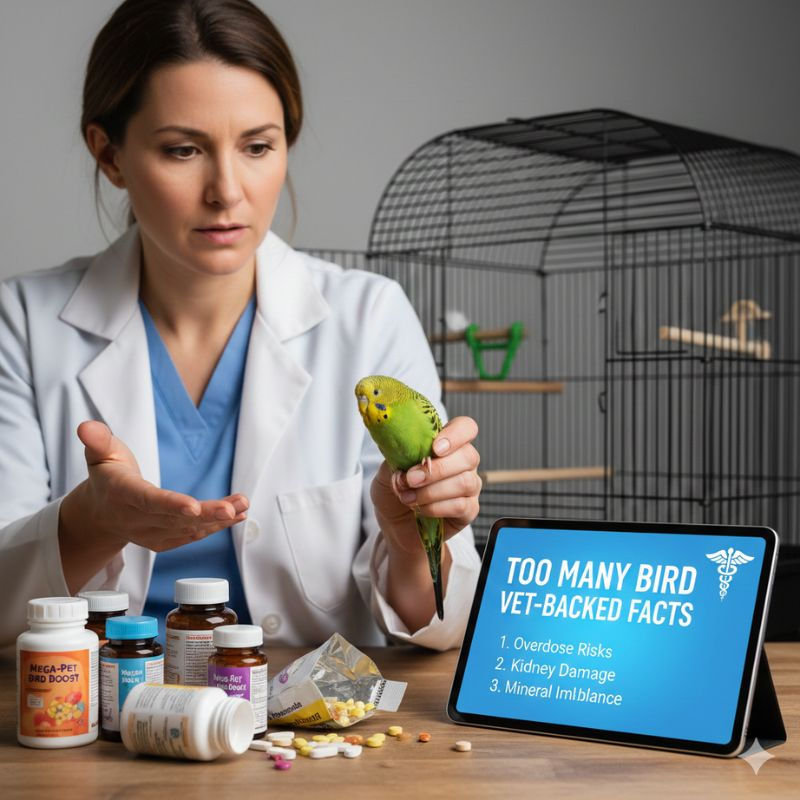Top 7 Signs Your Bird Needs Medication—and What to Do Next
- petperchlove
- May 6, 2025
- 4 min read

Birds are highly expressive creatures, but their subtle body language and behavior changes can often go unnoticed until their health condition becomes severe. As a responsible bird owner, it’s crucial to recognize the early warning signs of illness. Timely attention and the right bird medication can make all the difference between a quick recovery and a critical situation.
In this guide, we’ll walk you through the top 7 signs your bird may need medication, what these symptoms might mean, and how to respond effectively to support optimal Bird Healthcare.
1. Sudden Change in Appetite or Weight
A noticeable drop in appetite or unexplained weight loss is often the first red flag. Birds are small, and even a slight decrease in food intake can lead to malnutrition quickly.
What to Do: Monitor your bird's eating habits closely. If your bird is avoiding food, especially their favorites, it could be a sign of digestive issues or infections. Bird medicine such as appetite stimulants or probiotics may be recommended by your avian vet. Always keep emergency supplies handy from trusted sources like Kwik Pets, where quality bird products and supplements are readily available.
2. Ruffled or Fluffed-Up Feathers for Long Periods
Birds naturally fluff up their feathers to regulate body temperature or relax. However, if your bird stays fluffed up for most of the day, it may be hiding illness.
What to Do: Prolonged fluffing can indicate fever, respiratory infection, or gastrointestinal distress. Seek veterinary evaluation immediately. The right bird medication may involve antibiotics or antifungal treatments, depending on the underlying issue.
3. Labored Breathing or Tail Bobbing
Breathing should be effortless. If your bird is breathing heavily, gasping, or shows visible tail bobbing when it breathes, it’s a serious concern.
What to Do: Move your bird to a warm, stress-free area and consult a vet immediately. Respiratory infections require fast-acting Bird medicine, and delays can be fatal. Preventive Bird Healthcare products like air purifiers or cage sanitizers can also help reduce the risk of infection.
4. Lethargy or Unusual Sleepiness
Is your bird unusually quiet, inactive, or sleeping more than usual? Lethargy is never a good sign in birds.
What to Do: Ensure your bird is hydrated and in a comfortable environment. A vet visit is critical to determine the cause—whether it's nutritional deficiency, infection, or internal pain. Medications may include vitamin injections, antibiotics, or anti-parasitic solutions.
5. Discharge from Eyes, Beak, or Nostrils
Healthy birds have clear, dry eyes and nostrils. Any sign of mucus, crust, or discharge signals infection.
What to Do: Clean the area gently and avoid over-the-counter human products. An avian vet can recommend proper Bird medicine such as eye drops, nasal sprays, or oral antibiotics. Keep your bird's cage environment sterile with trusted supplies from Kwik Pets to prevent recurrence.
6. Abnormal Droppings
Bird droppings are a direct indicator of your bird's digestive and general health. Watch for changes in color, consistency, or frequency.
What to Do: Green, black, or liquid droppings could signal anything from liver disease to parasitic infections. Early diagnosis and bird medication can manage or even reverse some conditions if caught early. Collect a sample before heading to the vet—it will aid in diagnosis.
7. Excessive Feather Plucking or Skin Irritation
Feather plucking isn't just a behavioral issue—it often stems from skin infections, mites, or allergies.
What to Do: Examine the affected area. Mite infestations or fungal infections may require medicated sprays, antifungal creams, or oral treatments. Ensure your bird has access to healthy Bird Healthcare items like natural perches, misting sprays, and mineral blocks.
What to Do Next: A Step-by-Step Action Plan
Observe and Document: Note symptoms, duration, and any changes in behavior or environment.
Consult an Avian Vet: Avoid self-prescribing or using human medication.
Use Verified Products: Only buy Bird medicine from reputable brands and stores like Kwik Pets that specialize in pet health.
Follow the Dosage Exactly: Misuse or overuse of bird medication can worsen the condition.
Keep the Environment Clean: Sanitize cages, food bowls, and perches regularly.
Why Early Detection Matters in Bird Healthcare
Birds hide illness instinctively, a trait inherited from their wild ancestors to avoid appearing vulnerable. This means symptoms often appear late in the progression of disease. Prompt action, regular check-ups, and using the right bird medication are key pillars of effective Bird Healthcare.
At Kwik Pets, you’ll find a range of specialized health products for birds—from immune boosters to probiotics and hygiene solutions—making it easier to care for your feathered friend at every stage of life.
Final Thoughts
Taking a proactive approach to your bird’s health can prevent most common illnesses. Knowing the signs of when bird medication is necessary and acting swiftly can be life-saving. Equip yourself with trusted Bird Healthcare products and reliable information—because your bird deserves the best.
For premium bird supplies, vet-approved medicines, and expert advice, visit Kwik Pets—your one-stop shop for everything your feathered friend needs.
FAQs
Q1. Can I give my bird over-the-counter human medicine?
A: No. Many human medications are toxic to birds. Always consult an avian vet before giving any kind of medicine.
Q2. How do I know if the bird medication is working?
A: Improvement in appetite, droppings, and behavior are good signs. However, always complete the full course of medication unless advised otherwise.
Q3. Where can I buy safe and reliable bird medicine?
A: Look for pet-specialty suppliers like Kwik Pets that offer vet-approved and quality-checked bird healthcare products.
Q4. What should I include in a bird first-aid kit?
A: Include electrolyte solution, wound disinfectant, syringe, feather-safe bandage, and basic bird-safe medications (as recommended by your vet).
Q5. How often should I take my bird for a check-up?
A: At least once a year. Birds age quickly, and regular health screenings can catch issues before they become serious.



Comments